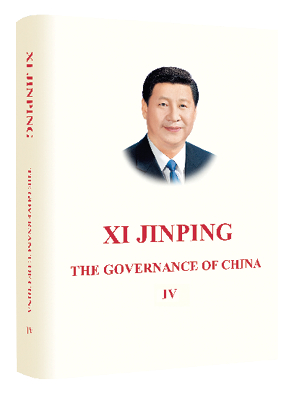
The fourth volume of Xi Jinping: The Governance of China comes at a time of great global turbulence, confrontations, crises, and economic distress. Three years of the COVID-19 pandemic have exacerbated the challenges of climate change, including frequent extreme-weather disasters, the increasing number of global refugees, and rampant poverty, as well as challenges unique to our digital era, such as data security and cyber security.
The world has also seen the failure of the global development model that was shaped by the World Bank and International Monetary Fund, the two global institutions set up following the meeting of over 40 countries in Bretton Woods, the U.S., under the leadership of the United States after World War II. This model has failed to address the global challenges of common development and security, and the ability of ensuring a life of dignity for all, equity and justice.
Undeniably, the world has accumulated unprecedented wealth during the last seven decades but ironically, it is also more vulnerable in terms of security and more unjust in terms of the distribution of wealth. The Bretton Wood institutions have been pumping finance combined with propagating their development model and political philosophy in developing countries but the threats of poverty, hunger, and deprivation are nowhere near eradication.
The pandemic has exposed the major flaws in the West-dominated global order. Even the richest and mightiest countries were unable to protect their citizens from the virus, or provide timely necessary treatment, medicine, and life-saving materials to those in most need. Many European and North American countries hoarded vaccines, worsening the situation. Most of the developed countries remained self-centered during this humanitarian crisis.
The fourth volume of Xi Jinping: The Governance of China covers a wide spectrum of topics: from political thoughts to issues of common concern and governance. Economic development has been given weight. Also, nine years after the Belt and Road Initiative (BRI) was proposed, it expounds high-quality Belt and Road development, which President Xi Jinping envisions as the result of high-quality cooperation, and is necessary for addressing the global challenges.
China’s generous support to other developing nations during the fight against the pandemic is an example of high-quality development shared by all. For example, Nepal has received the largest quantity of vaccines and lifesaving materials from China. China’s response to the pandemic was unparalleled both at home and internationally. It provided medical and material assistance to countries in dire need.
However, the speed of the BRI’s implementation, particularly projects on infrastructure connectivity, has slowed down due to several reasons during the pandemic. Hu Biliang, executive director of the Belt and Road School at Beijing Normal University, ascribed that to the following reasons: the spread of the pandemic; climate change issues, which meant some areas of the initiative had/have to be adjusted, which will need extra time and effort; and in addition, the attempt by some Western forces to stigmatize the initiative, which too blocked its advancement abroad to some extent.
Against this backdrop, the new volume provides President Xi’s insights into how to conduct high-quality Belt and Road cooperation, which will give a fresh impetus to global growth and make the world order more equitable, just and inclusive.
The BRI is a public good. At the Boao Forum for Asia Annual Conference in 2021, Xi proposed to make the cooperation people-centered for mutual benefit and hope. His emphasis remained on building closer partnership in health, connectivity and green development, a partnership that would be open and inclusive.
In the fight against the pandemic, Xi emphasized saving people’s lives and economic recovery, as evinced by his written message to the High-level Video Conference on Belt and Road International Cooperation in 2020. He also placed great emphasis on peaceful development and mutually beneficial cooperation, which are the fundamental pillars for building a high-quality Belt and Road.
He has several times expressed willingness to work with all partners to build the Belt and Road and make it a path of cooperation for addressing common challenges, a path of health for protecting people’s health and safety, a path of economic recovery and social development, and a path of growth to achieve development potential. As he said, “The epidemic is a stark reminder that the destinies of all nations are closely connected, and we humans rise and fall together. Be it in taming the virus or achieving economic recovery, we cannot succeed without solidarity, cooperation and multilateralism. Greater connectivity, openness and inclusiveness are essential if we are to overcome global crises of this kind and achieve long-term development.”
In a speech given at the Third Meeting on the Belt and Road Initiative held in November 2021, titled “Strive for New Progress in High-Quality Belt and Road Development,” he underlined the need for a new development philosophy to pursue high-quality, sustainable and people-centered growth through the Belt and Road Initiative. He emphasized turning political consensus into concrete actions and ensuring tangible results from the BRI cooperation. For this, he called for establishing more cooperation mechanisms and expanding cooperation in health, green development, digital economy and innovation.
To sum it up, Xi’s message on high-quality development of the Belt and Road centers around cooperation and collaboration for sustainable and people-centered development as well as addressing global challenges. The initiative should be open and inclusive, participatory and benefit-sharing. The challenges threatening humanity can be coped with only when parochial, self-centered, and elitist development policies are replaced with new policies to address the aspiration of billions to live a life of dignity. The development deliverables must be made inclusive and equitable across the globe. The challenges posed by climate change and the pandemic can be addressed effectively through the collective efforts of all nations, each entrusted with responsibilities based on their capabilities. 
LEELA MANI PAUDYAL is a former ambassador of Nepal to China.